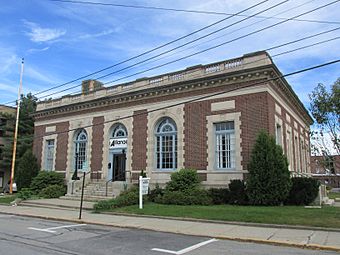Old Post Office (Biddeford, Maine) facts for kids
|
U.S. Post Office
|
|
|
U.S. Historic district
Contributing property |
|
 |
|
| Location | 35 Washington St., Biddeford, Maine |
|---|---|
| Area | 0.4 acres (0.16 ha) |
| Built | 1914 |
| Architect | James Knox Taylor |
| Architectural style | Classical Revival |
| Part of | Biddeford Main Street Historic District (ID09001146) |
| NRHP reference No. | 73000161 |
Quick facts for kids Significant dates |
|
| Added to NRHP | May 7, 1973 |
| Designated CP | December 24, 2009 |
The Old Post Office is a cool old building in Biddeford, Maine. You can find it at 35 Washington Street. It was built a long time ago, in 1914. This building is a great example of a style called Classical Revival architecture. It even helped inspire how other post offices looked later on!
This historic building was added to the National Register of Historic Places in 1973. That means it's a special place worth protecting. Today, it's not a post office anymore, but it has different offices inside.
Discovering Biddeford's Old Post Office
The former Post Office stands right on the corner of Washington and Federal Streets. This area is close to Biddeford's main business district. It's a single-story building made of strong materials.
What Does the Building Look Like?
The building is made with a steel and concrete frame. It's covered in red brick and fancy granite stone. The front of the building has five sections, called bays. Each section has cool granite blocks on the corners.
The two outer sections have rectangular windows. The middle three sections have round-arch openings. The main entrance is in the very center. It has double doors with columns on each side. Above the doors, there's a half-round window. The roof is flat and has a decorative edge.
The side of the building, facing Federal Street, is a bit simpler. It has another entrance and windows similar to the ones on the front.
Who Designed This Building?
The Old Post Office was designed by a special team. This team worked for the United States Department of the Treasury. At that time, James Knox Taylor was in charge of the designs.
The building was finished in 1914. It has only had one big change on the outside. In the 1930s, the original spinning front door was replaced. The new doors are the ones you see today.
This building's design was very popular. It became a model for many other Classical Revival post offices. These newer post offices were built in the 1920s and 1930s. In 1973, the government owned the building, but it was empty. Now, it's used for different businesses.



